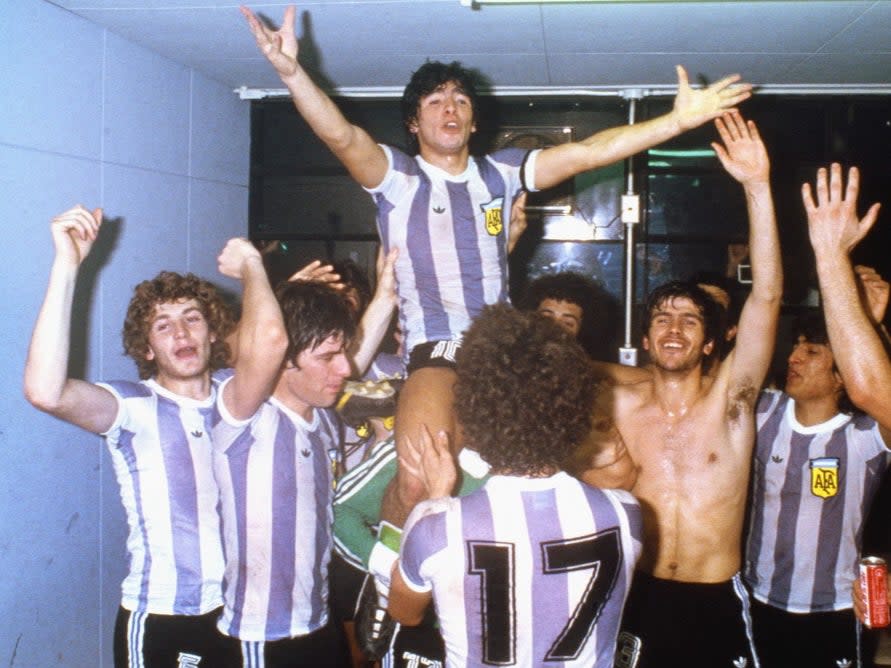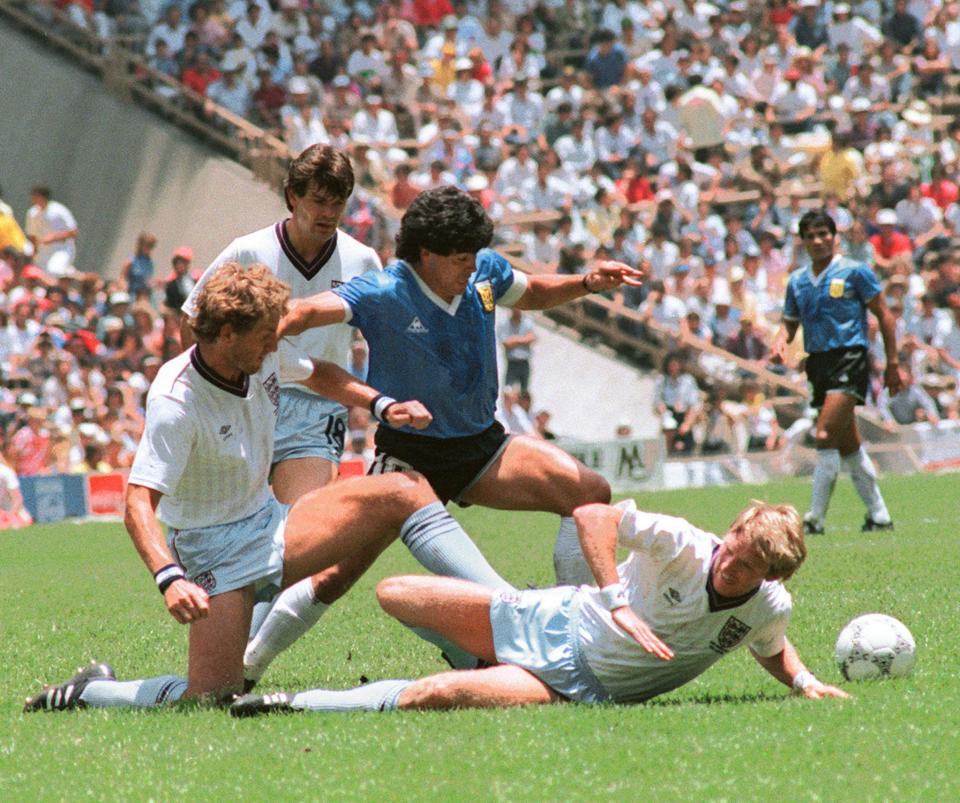‘Like having dinner and Jesus comes to eat with you’: What it was like to play with Diego Maradona

At the height of the 1986 World Cup, Argentina’s Hector Enrique was walking around the squad’s base and considering their plans for the next game, when a masked man suddenly jumped out at him.
Enrique was aghast, until all became apparent. It was Diego Maradona, who was by then removing a gorilla mask to reveal fits of laughter.
“He was a fun person,” Enrique tells The Independent. “Always joking.” This is the happy image so many of Maradona’s teammates remember, that now “brings a smile”. Moments of laughter were frequent.
Mauricio Pochettino was Maradona’s roommate at Newell’s Old Boys in 1993, and regularly sat idly with him watching football and remarking, in that way players do. Pochettino had by then become used to having Maradona as his teammate, so forgot himself, to the point he came out with the following. “Who does that guy think he is? Maradona?”
“I immediately covered my mouth,” Pochettino said in his book ‘Brave New World’, “but he was already pissing himself with laughter.”
Joyful as it all was, such anecdotes indicate something Maradona’s teammates had to get their heads around.
From most perspectives, there was the greatest player in history and perhaps one of the most famous people in the world. From the teammates’ perspective, there was a colleague, who they worked with every day.
The latter is a view that has naturally been overshadowed by celebrations of a legend in the commemorations after Maradona’s passing, but it is all the more compelling. The more everyday aspects of working with “an icon” haven’t been as discussed.
What was Maradona the teammate actually like? What was he like day to day? Was it demanding? Was it intimidating? Was it inspiring?
What was it like, well, to work alongside “God”.
The impression of such legendary sporting figures has naturally been influenced by The Last Dance’s portrait of Michael Jordan. Rarely has greatness been so scrutinised, and uncovered. Rarely has it looked so difficult.
That documentary indicated that constant tension is the price of sporting immortality. This is what you have to put up with.
Except, no-one says this about Maradona.
As complicated as his life away from the pitch might have been, the picture painted by his former teammates is one where his image greatly improves. He was not a primadonna with them. All four interviewed for this piece were effusive in their admiration for Maradona. Most of his old teammates have changed their Whatsapp picture to one of them and their former colleague.
“He didn’t have anything like the same characteristics as Michael Jordan,” 1986 teammate Nestor Clausen says. “He was humble, positive, a good teammate, always very supportive.”
That could be seen in how he greeted new players, such as with Enrique in the training camp ahead of the 1986 World Cup.
“I was very nervous because I was going to meet Diego Maradona! An idol. I didn’t know how I would greet him. Should I kiss him on the cheek, shake hands, or something quick? But Maradona made it so simple. He gave me a hug as if we knew each other all our lives. He treated me as a colleague, as one of the squad. That filled me with emotion and joy.”
“He really was one of the lads,” Nicolas Olarticoechea explains. “Despite the double extra of his extraordinary ability and his personality, he was able to easily integrate. He was able to speak with anyone and on whatever subject. He always said what he thought, whether you liked it or not. He was a person without a filter, as we say. He didn’t keep anything in. He spoke to everyone the same.”
Maradona himself was quickly aware he was seen as different to everyone else, and the effect it had on them. It was hard not to be aware, given what he could do with a ball.
Stories abound of Maradona astounding his teammates with his ability every day. Gary Lineker’s anecdote about repeatedly kicking the ball high into the air and still controlling it strikes a chord with all of his former colleagues.
During that 1986 World Cup, Maradona one day walked from his bedroom to the dinner table while juggling a ball, and never once let it hit the ground even when seated. More regularly, he used to carry around a favoured water bottle, and “would do things with it that teammates couldn’t do with a ball”. As goes without saying, he could execute the “Maradona seven” - both feet, both knees, both shoulders, head - with that bottle.
READ MORE: It’s time for English football to let it go and appreciate Diego Maradona’s genius

Maradona was loved by his teammates
AFP via Getty Images“He was extraordinary,” says Olarticochea, who famously cleared Lineker’s header off the line in that 1986 match. “It was even the way he struck the ball. He had a control no one else had.”
While that ability afforded Maradona many privileges, what stood out was how he used it to lobby for his teammates.
One story from Boca Juniors in 1981 saw a group of their notorious Barras brava supporters arrive at the training ground to confront the team about poor results, only to tell the young Maradona he was exempt. The 20-year-old replied that if they didn’t leave, he wouldn’t play the next game.
Around the same period, the 19-year-old Claudio Tapia was called up for his international debut against Chile in Mendoza. Maradona saw he wasn’t happy with his old boots and called him up to his room.
“He gave me a gift of Pumas he had, because he was an ambassador of Puma,” Tapia says. “I made my debut with those boots. I felt so lucky.”
“He made some very good gestures,” Olarticochea adds. “He’d willingly give presents of watches worth $15,000 or $20,000. He didn’t have any problems in that way. If he liked you, he would give you anything. Ahead of the 1990 World Cup, a well-known drinks company offered him a lot of money for sponsorship, and he wanted to include all of us. The company wouldn’t accept this so he refused. He wanted us to benefit, too.”
“He always fought for us,” Tapia says.
That attitude goes hand in hand with something Maradona has been admired for over the past few days, and really does represent the total opposite of Jordan. He would refuse to berate or criticise inferior teammates for mistakes or poor play.
“He never shouted at us,” Enrique says. “He understood that we could make a mistake, that we didn’t have the ability he had. He never showed us any lack of respect. That’s why we had such time for him and valued him so much.”
In describing him as a captain, all former teammates use the words “humble” or “encouraging.”
“He was a positive leader,” Clausen says. “He gave us a lot of confidence and a lot of motivation to play.”
There was also his tactical intelligence. Maradona would advise players through his words, but also his movements. His understanding of the game was also innate.
“In play, he was like a mirror for us,” Enrique says. “When he wasn’t involved, he would take up a position that set the shape of the team. We knew what to do and where to go because of where he was.”
Dr Oscar Mangione was previously sports psychologist for Boca and Argentina, and he directly worked with Maradona, watching all this from a clinical eye.
“I have seen him in the dressing room, and he was a positive leader,” Mangione says. “He used to say he was happy to be playing alongside them rather than the other way around. He didn’t give up and was continually looking to bring the best out of his fellow players. He knew the quality each one had. He didn’t interrupt when the coach was speaking, but was a natural motivator. He was always positive, whether the team won or lost.
“He was different to [Leo] Messi, who is a great player, but not a leader. He hasn’t got that quality of speaking to people through adversity. He goes within himself. Whereas with Maradona, he got stronger. The players had so much faith in him. They were like fans playing alongside him.”
Dr Mangione believes this ability to speak to people came from Maradona’s background.
“He lacked a formal education, but was very intelligent. He had the intelligence of a survivor. The neighbourhood he grew up in was very difficult and the people were poor, so it’s very easy to sink. Maradona took note of things. He was very generous.”
Maradona maintained a good relationship with the vast majority of all his former teammates. He was even part of a Whatsapp group for the 1986 squad, but left it after one debate too many. “We know what he’s like,” Olarticoechea laughed at the time. “He’s temperamental!”
That’s one part of the image, as is that of the joker. There was the gorilla mask, there was the “DJ” that jumped on top of his own car and beckoned players off the team bus to join him for a dance.
Above all, there was the image Enrique paints, that was familiar to many.
“To play with Maradona was like having dinner with your family and Jesus suddenly comes to eat with you. That’s what it was like to be his teammate. I can die happily having played with Maradona.”
Read More
The genius and joy of Diego Maradona
Maradona was the two-faced god of football who never grew up

 Yahoo Finance
Yahoo Finance 